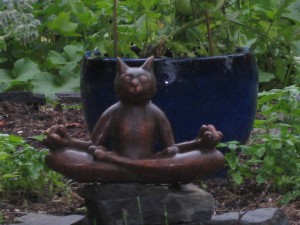As we go into this weekend of remembering, recalling the 9/11 event that sent many people reeling into PTSD, I wish to point to the healing properties of the shamanic practice of recapitulation and the synchronicity of the publishing of Jan’s book, The Man in the Woods—The Recapitulation Diaries: Year One.
My entire professional career has been dominated by the treatment of PTSD. This was never a conscious choice on my part, it’s just the way it unfolded.
My entire spiritual life has been dominated by the shamanic work of Carlos Castaneda, from my teens to the present day.
When Carlos Castaneda and his cohorts—Carol Tiggs, Florinda Donner Grau and Taisha Abelar—faced the ending of their shamanic line, the enormity of the potential loss of the knowledge of the seers of Ancient Mexico weighed on them greatly. They chose to make that knowledge available to everyone in a new format called Tensegrity. Previously taught to only a chosen few with the right energetic configuration, tensegrity was suddenly launched, offering the ancient secrets to anyone wishing to learn them. In fact, Carlos said that previous to this moment he had been a documentor of the teachings of don Juan and the shamans of Ancient Mexico, but now he was faced with having to make a crucial decision regarding their very existence. Could he face the fact that he was the end of the line and what he had learned would be lost? Anthropologist that he was, he just could not fathom taking this ancient knowledge to his grave.
Jeanne and I entered the world of tensegrity nearly at its inception and fully immersed ourselves in its teachings and practices. Jeanne was determined to heal from breast cancer and remain in this world through its practices and we were both determined to reach our energy bodies, to meet each other in our energetic states beyond this world.
By May of 2001, worlds collided: Jeanne was nearing the end of her time in this world, Jeanne and I were facing the end of our worldly relationship—the knowledge of the ancient seers coursing through our veins—and then I encountered Jan, who was ending a marriage and opening the door to facing lifelong PTSD. Indeed, Jan’s final trigger to fully recapitulating was the traumatic event that happened on 9/11! This event too was many worlds colliding. And now, with the publication of her book, The Man in the Woods, I am freed to speak more openly about the collision of those personal worlds.
Carlos was deeply concerned that the knowledge of his shamanic line not be lost to the world. Tensegrity opened the door to that knowledge, but what direction would it take? And where would it be helpful? In spite of these and other questions, the greater intent was that tensegrity and the ancient knowledge find its way into the modern world. By teaching it to as many people as possible, Carlos and his cohorts intended that it would find its way and that its usefulness would become both readily available and readily apparent.
When I met Jan, I was completely saturated by the shaman’s world and saw the value of using the tools I had amassed in that world to help her. Jan had encountered what the shaman’s would call a petty tyrant of astronomical proportions in her earliest childhood. That tyrant dominated her existence into early adulthood. The encounters with him led to a defensive psychic fragmentation resulting in lost memory and an extremely defended life.
The shaman’s world uses experiences with this kind of tyrant to the advantage of honing warrior skills. A very negative, debilitating experience is turned on its ear, into a positive opportunity. This reframing of PTSD is sorely lacking in the clinical field, which relegates sufferers to the category of survivor, saddled with triggers for life.
Furthermore, the shaman’s world provides the tool of recapitulation; essentially, the tool necessary to completely retrieve one’s lost soul. With recapitulation, an individual fully relives the shamanic journey of their life, retrieving all energy lost during life’s challenges and releasing the internalized energy of others that has held one’s resources in check.
For Jan, recapitulation became the tool to fully discover the truth of her childhood journeys, when she was taken into dark, horrific worlds by a sadistic, calculated, predatory tyrant. The consequences of her successful recapitulation were the retrieval of her innocent self and the expulsion of the predatory tyrant’s grip.
As Jan took her recapitulation journey, Jeanne, who had left this world in December of 2001, returned in her energy body to guide and support Jan through that journey. Today, and for several years now, Jan has received guidance from Jeanne for all of humanity, which she passes along in weekly channeled messages.
As a result of Jan’s shamanic practice, she fully healed from PTSD and truly honed her shamanic warrior skills. Her book is a testimony to turning the limitations of PTSD on its ear, turning it into an evolutionary opportunity of magical proportions.
The collision of worlds—the shamans, Jeanne, myself, and Jan—has resulted in one valuable transmission of the intent of Carlos and his lineage that the knowledge of the seers of Ancient Mexico make its way into the modern world, in this case offering the opportunity to fully heal from PTSD. And, beyond that, to evolve the human potential in new directions.

Thank you, Jan, for so boldly publishing your story, a complete documentation of new possibility.
Love,
Chuck
Here is the link to the amazon page where free apps are available for download so you can read the ebook: The Man in the Woods—The Recapitulation Diaries: Year One. Also note that the print version is being prepared and should be uploaded next week.




